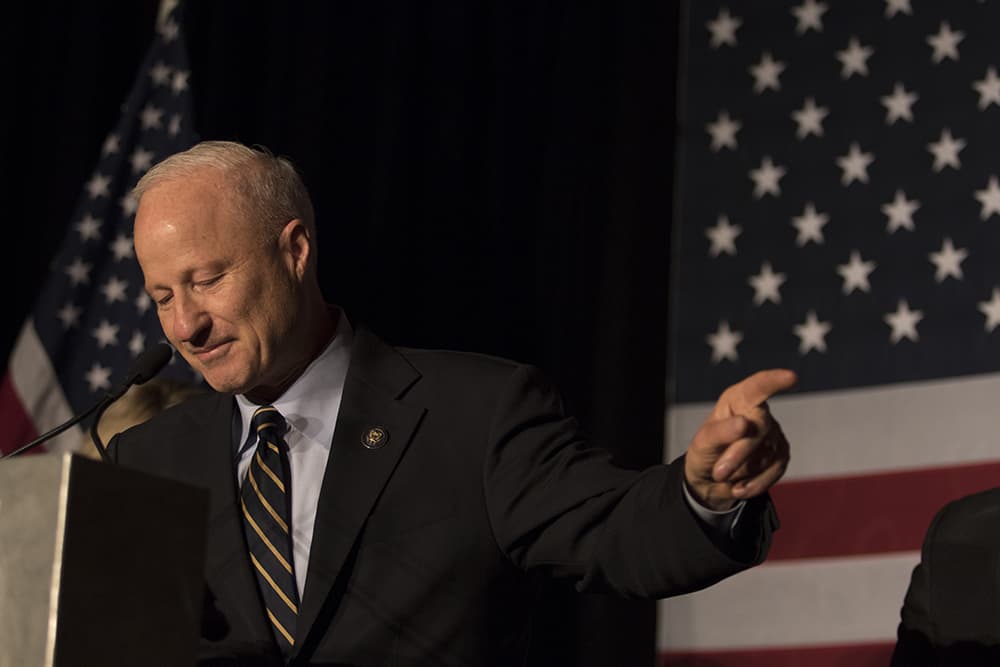
U.S. Rep. Mike Coffman said the Republican replacement plan for the Affordable Care Act represents "major entitlement reform" -- and that's a good thing.
The same Medicaid changes that have raised concerns even for some Republicans, including Colorado's Republican senator, Cory Gardner, are one of the exciting things about the bill for Coffman.
"There are elements I don't like, but all in all -- and we're talking about major policy overhaul -- I like what we're doing," Coffman said on Ross Kaminsky's radio show Tuesday morning. "This goes much further than the Affordable Care Act. ... This is a major entitlement reform."
On Twitter, Coffman said he's still reading the bill to "make sure it is in the best interests" of his constituents.
Some of those constituents are already letting the congressman's staff know what they think of the bill.
The bill, which was filed Monday, already faces an uphill battle. Conservatives and liberals alike have major policy critiques. Powerful lobbies like the American Hospital Association and the AARP have come out against it. Some budget hawks in Congress are concerned the tax credit provisions amount to a new entitlement program. Right before the bill was released, Gardner joined three other Republican senators in a letter that said any replacement needs to protect the population covered by the Medicaid expansion.
The replacement bill calls for the Medicaid expansion, which so far covers 453,000 people just in Colorado, to continue through the end of 2019 and then be frozen, with no new people enrolled after that. Coffman said that in a briefing he received on the bill, he was told that people covered under the expansion would leave the program through attrition, for example by earning more money and losing eligibility, over the next five years after that.
The Republican bill also calls for Medicaid to change from an entitlement program that covers all the costs of everyone who is eligible to a per-capita cap per enrollee. Many health care analysts believe this change will force cuts to the program to save money, but similar to earlier proposals to change Medicaid to a block grant, Coffman said the change would give states "skin in the game" when it comes to controlling costs and encourage creative solutions.
"If you shift the responsibility back to the states, they will figure out much better ways to do this," Coffman said. "Getting away from the fee-for-service system in this population and moving it over to managed care. Once they have skin in the game in terms of control over the policy, they'll make rational decisions. ... We'll have 50 laboratories of experiments. The more we can shift down to states, the better. There will be people who argue about that, that the states couldn't meet the obligation, but neither could we (in the federal government)."
Kaminsky asked the million dollar question: Can this bill pass? And he wondered whether the conservative Republicans who don't like the tax credit provisions will want to be seen as the people who blocked repeal efforts.
"There are people who will sit on their hands because it's the easy thing to do politically, and I get that," Coffman said. "But let me tell you, if you look at this overall as to what it does, I think it's a positive move for this country.
"I hope we have the support for it. I'm starting to have doubts," he added.
Kaminsky cast the political stakes as pretty high. The Republicans have campaigned for years on repealing Obamacare, and if a Republican House and Senate cannot pass a replacement that a Republican president will sign, it will be hard for Republicans t0 make an argument "for why they should even exist as a party," he said.
Coffman said he agrees and noted that by doing the replacement through the process of budget reconciliation, Democrats cannot filibuster the bill in the Senate. However, Republicans have just 52 votes, so any defections will matter.
"As long as enough Republicans stand together, we can get this passed and get it to the president's desk. If not, that's a problem," Coffman said.
You can listen to the whole thing here.
Coffman plans to hold some telephone townhalls on health care later this month -- dates TBD. He also plans to hold an in-person townhall in April.













